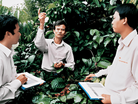Nestlé New Coffee Variety Promises Stronger Supply Chain

Nestlé, the global food and beverage giant, has taken a significant step towards addressing the sustainability challenges facing the coffee industry.
As climate change threatens to drastically reduce suitable land for Arabica coffee cultivation by over 50% by 2050, Nestlé has leveraged its agricultural expertise to develop an exciting solution.
The global coffee industry faces numerous challenges, from climate change, to economic volatility, to sustainability concerns.
For the coffee industry, climate change is causing reduced yields and increased vulnerability to pests and diseases. At the same time, economic fluctuations make long-term planning difficult for growers and traders amongst growing consumer demand for environmentally and socially responsible coffee production.
In response to these challenges, Nestlé plant scientists and agronomists have successfully created Star 4, a new Arabica coffee variety, using traditional breeding methods.
This innovative strain is designed to be high-yielding and resilient, while maintaining the distinctive flavour profile of Brazilian coffee.
How will Nestlé Star 4 strengthen the coffee supply chain?
Star 4 aligns with the company's broader agriculture framework, which champions sustainable farming and responsible sourcing practices with initial trials of Star 4 conducted in São Paulo and Minas Gerais, two of Brazil's renowned coffee-growing regions.
Nestlé says the Star 4 represents a crucial advancement in sustainable coffee production, addressing the growing global demand while safeguarding the future of coffee supply chains.
The development of this robust coffee variety contributes to broader sustainability efforts within the food industry and boasts several advantages: larger bean size, coffee leaf rust resistance, and substantially higher yields compared to local Brazilian varieties.
These characteristics, Nestlé says, could help reduce its carbon footprint while enhancing farm productivity and resilience.
As a result, Star 4 could boost farmers' incomes whilst securing a more stable coffee supply.
Nestlé's partnership with the Brazilian foundation Procafé, to register the variety in Brazil, demonstrates the company's commitment to collaborative, locally-relevant solutions and this initiative aligns with Nestlé's broader sustainability goals, including its aim to source 100% of its coffee responsibly by 2025.
Nestlé investments in AI to utilise Arabica
There are more than 120 species of coffee, but around 70% of the world's coffee production is made up of Arabica.
As part of this challenge, Nestlé experts have developed a high quality arabica reference genome using advanced data science methods.
The reference genome, which is available in a publicly-available digital database, makes it easier to analyse different traits of coffee varieties to identify specific traits such as better yield, coffee cherry size and greater resilience to disease or drought, as well as flavour or aroma characteristics.
By using AI to map the genomic structure of Arabica coffee plants, Nestlé can also create a comprehensive database to identify desirable traits such as disease resistance and drought tolerance.
This data-driven approach aims to breed more resilient Arabica varieties, addressing climate change challenges and supporting sustainable coffee production.
The company is also collaborating with global research partners and farmers to implement these AI-driven insights, working with organisations like TechnoServe and USAID to support coffee-growing communities in regions such as the Democratic Republic of Congo.
And joining forces with two of its suppliers, Cargill and ETG | Beyond Beans, Nestlé aims to launch a pair of projects using agroforestry to regenerate land around cocoa farms and cut carbon emissions in its supply chains.
Jeroen Dijkman, Head of Nestlé’s Institute of Agricultural Sciences, says: "We are proud to make another important step towards resilient coffee supply chains, ensuring that consumers can continue to enjoy great coffee in the future. The new variety is characterised by its larger bean size and coffee leaf rust resistance.
“Our field trials have demonstrated that, using similar inputs, the yields of Star 4 are substantially higher than the two most used Brazilian local varieties, which reduces its carbon footprint".
Marcelo Burity, Nestlé’s Head of Green Coffee Development, says: "Optimising cultivation practices remains vital as they are the primary factor contributing to the environmental impact of a cup of coffee."
Star 4 aligns with the company's broader agriculture framework, which champions sustainable farming and responsible sourcing practices with initial trials of Star 4 conducted in São Paulo and Minas Gerais, two of Brazil's renowned coffee-growing regions.
--------------
Make sure you check out the latest news at Food Digital, a BizClik brand.




